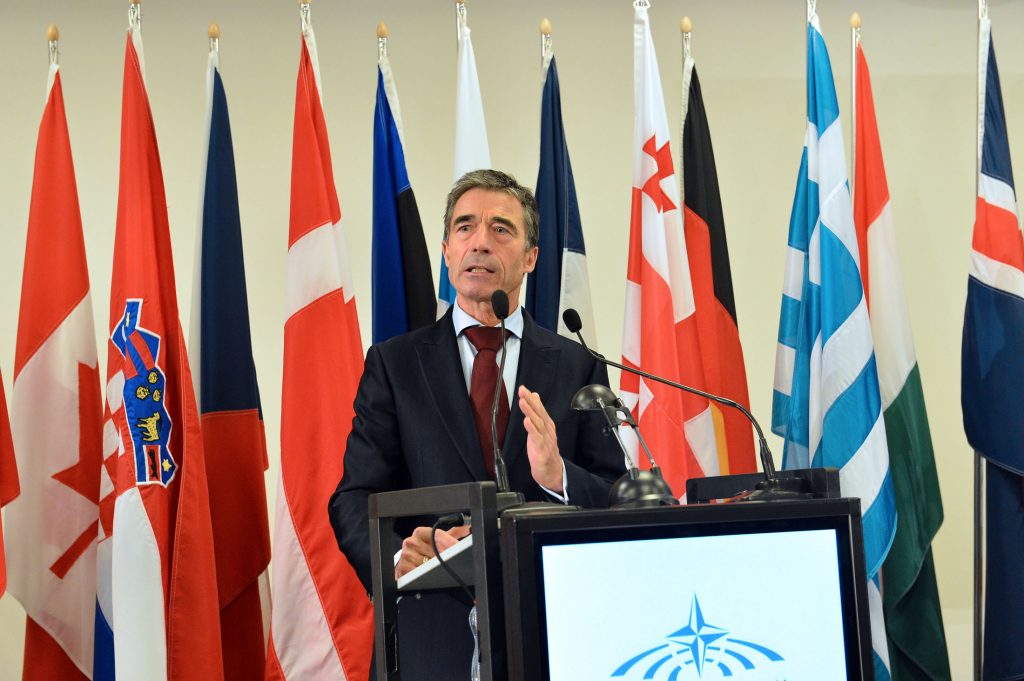
From Anders Fogh Rasmussen, NATO: Defence spending is declining across the Alliance. We need an economic recovery. And based on that, we need a defence recovery. We need to stop the decline. And then we need to reverse it.
I believe that is possible. But it is going to require commitment, and active support. From NATO’s leaders, and from you, NATO’s parliamentarians.
I am a politician like you. So I understand the political reality. When people are asked where governments should cut spending, defence is often the first area they mention.
But as politicians, we all need to explain that there is also the security reality. Freedom does not come for free. And any decisions taken to improve our economy must not lead us into a different sort of crisis – a security crisis.
To protect our people effectively, governments must continue to invest in real security. We need to have the right forces and capabilities to deter and defend against any threat to keep our nations safe.
And let us be under no illusion, our safety and security will be challenged.
Crises will remain unpredictable, just as Libya was last year. Failed states will continue to host terrorist organisations that threaten us.
Proliferation of weapons of mass destruction, and the missile systems to deliver them, is unlikely to stop overnight.
And our sea lanes and other vital transport and communication systems will still need to be protected.
All these complex challenges will not disappear while we focus on the economic crisis. They will not wait for our economies to recover. In fact, they may become even harder to tackle if we look away. So we need to continue to keep our defences strong. . . .
At our Summit in Chicago in May, we set ourselves the goal of “NATO Forces 2020” – forces that are more capable, more compatible, and more complementary. And we can get there through Smart Defence and the Connected Forces Initiative – if we back them up with the necessary political willpower. . . .
Smart Defence is a new guiding principle for capability development. By joining together to acquire capabilities, nations will be able to afford what they cannot do alone. It is about greater resource efficiency and doing better with what we have. This is not an excuse to do less with less. The key to Smart Defence is greater prioritisation, specialisation and, most importantly, multinational cooperation.
Since Chicago, we have already made encouraging progress. For example, we are buying drones that will give us a NATO-owned and operated intelligence and surveillance system. Our missile defence system to protect our populations and territories is now operational. And here in Prague, we have the example of the Multinational Logistics Coordination Centre which enables Allies to work together more effectively. Many more projects are coming through the pipeline. . . .
The Connected Forces Initiative is focussed on our operational effectiveness. Every day, NATO forces are working shoulder-to-shoulder from Afghanistan to Kosovo and off the coast of Somalia. They have also developed the habit of working with partners from outside the Alliance. This is a vital skill, and it’s one we need to retain after we complete our ISAF mission in Afghanistan. Here again, multinational approaches can help.
There is considerable scope for making our training and education more multinational. For boosting multinational contributions to our exercise programme, especially where the NATO Response Force is concerned.
In sum, multinational solutions will be vital for sustaining our effectiveness as an Alliance. They will allow us to get more bang for the buck – or euro; and more security for our limited resources. They will lead to savings that can be reinvested in other vital defence areas. They will ensure we focus on priorities, and on developing capabilities that can operate together. And they will help defence industry by offering multinational contracts, and jobs, where otherwise there would be none. . . .
As Secretary General, I will continue to play my part. I will look for new solutions and multinational approaches. For more possibilities to connect our forces together, both within Europe, across the Atlantic, and with our partners. For ways to engage directly with industry. And to make better use of common funding. So that we keep both our capabilities and our partnerships strong in the 21st century.
But the Alliance also needs you to do more. As members of your national parliaments, you have considerable responsibilities. You have to make the difficult choices about protecting our security, our prosperity, and the sovereignty of our nations.
You also have considerable responsibilities as members of the NATO Parliamentary Assembly. NATO needs you to continue explaining to your colleagues in parliament, and to your voters at home, why investment in defence and security remains essential to protecting the values that underpin our way of life..
NATO needs you – the decision-makers — to look for the multinational solutions so that Smart Defence and the Connected Forces Initiative are fully implemented to help us through these difficult economic times. And, most importantly, NATO needs you to help hold the line on defence spending, to avoid the risks that would be created through further cuts. We need you to increase defence spending as soon as the economic situation allows.
Keynote speech by NATO Secretary General Anders Fogh Rasmussen at the NATO Parliamentary Assembly in Prague. (photo: NATO)
Image: nato%2011%2013%2012%20Prague.jpg
